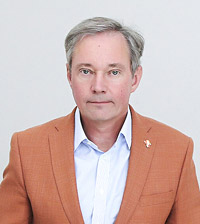
Electronic english version since 2022 |
The newspaper was founded in November 1957
| |
At the Dubna University
New opportunities for students
At the Department of Fundamental Problems of Physics of the Microworld of the Engineering Physics Institute (MEPhI) at the Dubna University, changes have occurred - the master's profile "Physics of quark-gluon matter" in the area of 04/03/02 Physics has been changed into the profile "Modern Theoretical Physics".
 Questions about the new profile are answered by Acting Head of the Department of Fundamental Problems of Microworld Physics of MEPhI, Doctor of Physical and Mathematical Sciences A.B.ARBUZOV.
Questions about the new profile are answered by Acting Head of the Department of Fundamental Problems of Microworld Physics of MEPhI, Doctor of Physical and Mathematical Sciences A.B.ARBUZOV.
Andrey Borisovich, please, tell us why it has been decided to change the profile "Physics of quark-gluon matter" into "Modern Theoretical Physics"?
- The educational programme "Physics of quark-gluon matter" has been implemented as a master's profile in the area of 03.04.02 Physics at the Institute of Physics of the Dubna University since 2020. Afterwards, an ambitious goal was set to develop a unique master's programme for training theoretical physicists capable of carrying out fundamental scientific research in the field of quark-gluon matter physics and studying the structure and evolution of the Universe. The relevance of this area concerns, first of all, the rapid development of experimental and theoretical investigations of heavy ion collisions at advanced and future colliders, including the NICA accelerator complex. The programme worked successfully, but in reality, the department trained young specialists in a wider range of areas of theoretical and mathematical physics. In order to attract students wishing to specialize in research in other relevant areas, it was decided to modify the educational area. At the same time, the new name of the profile "Modern Theoretical Physics" emphasizes the most relevant and popular areas, including, surely, the physics of quark-gluon matter.
What does the "Modern Theoretical Physics" profile programme consist of?
- Theoretical physics is a rather conservative branch of science. It sets itself the task of studying the most fundamental laws of nature. Nevertheless, in each period of its development, the most popular research areas can be identified that often concern obtaining new experimental data. I have highlighted the following: quark-gluon matter physics, gravity and cosmology, elementary particle physics, mathematical physics, solid state physics, nuclear physics.
Has the course programme changed due to the new name?
- The programme changes are minor. Modifications of courses on theoretical nuclear physics, models of gravity, cosmology and high energy physics have been carried out.
What is the competitive advantage of the discussed master's programme in theoretical physics compared to those available at other universities?
- As already stated, we focus on the most relevant, widely developing areas of theoretical research. Students undergo practical training at the Bogolyubov Laboratory of Theoretical Physics of the Joint Institute for Nuclear Research. They get involved in meeting issues at the very cutting edge of science. Scientific supervisors are scientists that extensively work at the highest global level.
Where are your graduates in demand today? What organizations do they work for?
- Over the years, most of our graduates begin their careers in the Laboratory of Theoretical Physics and other JINR laboratories. A large number of graduates enter graduate school at our or other universities, including foreign ones. A high level of education in theoretical physics provides general skills in analysis and addressing complex tasks, as well as allows our graduates to apply their abilities to other areas of human activity, including programming, finance, work in government corporations and others.
Interviewed by Olga KLIMENKO,
photo by Svetlana ZORINA